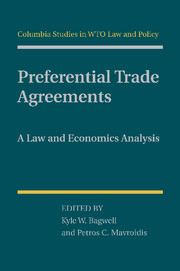Book contents
- Frontmatter
- Contents
- Contributors
- Introduction: The Law and Economics of Contingent Protection
- 1 Preferential Trading Agreements: Friend or Foe?
- The “Legalization” of GATT Article XXIV – Can Foes Become Friends?
- 2 Third-Country Effects of Regional Trade Agreements
- 3 Contingent Protection Rules in Regional Trade Agreements
- 3.1 Commentary on “Contingent Protection Rules in Regional Trade Agreements”
- 4 The Limits of PTAs
- 5 EU and U.S. Preferential Trade Agreements: Deepening or Widening of WTO Commitments
- Straightening the Spaghetti Bowl
- 5.1 Comments on “Beyond the WTO? Coverage and Legal Inflation in EU and U.S. Preferential Trade Agreements”
- 6 Labor Clauses in EU Preferential Trade Agreements – An Analysis of the Cotonou Partnership Agreement
- 7 Do PTAs Actually Increase Parties' Services Trade?
- 8 A Model Article XXIV: Are There Realistic Possibilities to Improve It?
- 8.1 Comments on “A Model Article XXIV: Are There Realistic Possibilities to Improve It?”
- Index
- References
1 - Preferential Trading Agreements: Friend or Foe?
Published online by Cambridge University Press: 03 May 2011
- Frontmatter
- Contents
- Contributors
- Introduction: The Law and Economics of Contingent Protection
- 1 Preferential Trading Agreements: Friend or Foe?
- The “Legalization” of GATT Article XXIV – Can Foes Become Friends?
- 2 Third-Country Effects of Regional Trade Agreements
- 3 Contingent Protection Rules in Regional Trade Agreements
- 3.1 Commentary on “Contingent Protection Rules in Regional Trade Agreements”
- 4 The Limits of PTAs
- 5 EU and U.S. Preferential Trade Agreements: Deepening or Widening of WTO Commitments
- Straightening the Spaghetti Bowl
- 5.1 Comments on “Beyond the WTO? Coverage and Legal Inflation in EU and U.S. Preferential Trade Agreements”
- 6 Labor Clauses in EU Preferential Trade Agreements – An Analysis of the Cotonou Partnership Agreement
- 7 Do PTAs Actually Increase Parties' Services Trade?
- 8 A Model Article XXIV: Are There Realistic Possibilities to Improve It?
- 8.1 Comments on “A Model Article XXIV: Are There Realistic Possibilities to Improve It?”
- Index
- References
Summary
Preferential trading agreements (PTAs) have proliferated inexorably during recent years. Virtually all countries are members of a trade bloc and many belong to more than one; more than two-fifths of world trade takes place within such agreements; PTAs are often advanced as a route to development for poor countries, both PTAs with other poor countries and with richer neighbors.
This chapter introduces some of the main arguments that have been advanced for and against such regionalism, especially, because this is my principal interest, as a tool of development policy. It briefly considers not only the traditional economic issues such as trade creation and trade diversion, but also more recent economic arguments such as whether PTAs stimulate investment and growth or promote economic and political credibility, peace, and stability. PTAs matter for individual countries: for potential members there are questions of whether to join (or perhaps with whom to join) and on what terms; for nonmembers, questions of whether others' PTAs will have adverse effect on them. In addition, PTAs matter systemically: here the issue is whether they strengthen or weaken the multilateral trading system that has served the world well for the past six decades. In the terminology of Baldwin's (2008) excellent recent survey, there are both “small-think” (individual) and “big-think” (systemic) dimensions to the question of regionalism, although I do not accept the implication that the former are uninteresting or unimportant.
- Type
- Chapter
- Information
- Preferential Trade AgreementsA Law and Economics Analysis, pp. 7 - 30Publisher: Cambridge University PressPrint publication year: 2011
References
- 2
- Cited by



